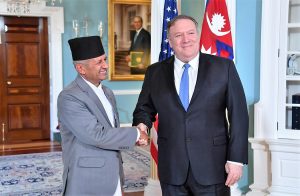The United States may not have expected the criticism it received for the grant aid, in the form of the Millennium Challenge Corporation (MCC) pact, that is in the process to be passed by the parliament of Nepal. However, the Nepali parliament is dominated by the Nepal Communist Party (NCP), and its members have had a strong anti-capitalist education.
“If the MCC will be passed in Nepal, the Communist Party will cease to exist because the U.S. will never tolerate the word ‘Communist,’” remarked a Communist leader in a private conversation with a low depressed voice.
There is mutual hatred between the United States and the international communist movement. Communist cadres look at the dependency theory and assume that the United States is the root of all evil. They also assume that Washington will not hesitate to exploit smaller, “periphery” countries. Nepal, a land-locked country in the Himalayas, is one such state.
Nepal’s government maintains a strong leftist ideology, but the leadership in the NCP are more “realist” than they are communist. In the past, Nepal’s communists did not hesitate to ally themselves with the monarchist party, with the two opposite poles of the political spectrum allying themselves for the sake of electoral success. But unlike a temporary alliance at election time, passing the MCC will have a lasting impact. This is problematic for cadres who continue to believe in communist philosophy.
Nepal’s Communist Party has lacked stability both in terms of its foreign policies as well as its institutional unity, two trends that continue to this day. In one major example of the nexus between internal disunity and foreign policy, Bam Dev, a prominent communist leader, split the party in 1998 over a dispute stemming from the Party’s voting in favor of the Mahakali Treaty in the parliament. To Dev, the treaty discussing water-sharing with India was assumed to be an unequal treaty.
The Nepal Communist Party was established in Calcutta, India on September 15, 1949, and since then the Communist Party has had a love-hate relationship with India. The Maoist faction that declared a civil war against the kingdom of Nepal has long articulated a strong anti-Indian narrative, raising the issue of national sovereignty. However, it was suspected at the time of civil war that the Communist leaders actually lived in India and were supported by the Indian government. This became evident to the public when the former editor-in-chief of the largest Nepali newspaper, Sudhir Sharma, wrote his book Prayogshala about the role on India in the Maoist insurgency after the conflict had been resolved.
Nepali Communists at one point benefitted by holding a strong pro-Moscow stance. The Soviet Union, after all, would provide scholarships as per the recommendation of the Nepal Communist Party. But international politics dramatically changed after the collapse of the Soviet Union, and Nepal was not immune. As a result, Nepali Communists started to compromise to match present-day realities, including by experimenting with their relationship with other international actors.
Relations between India with the Nepalese Communist have been nothing less than turbulent. The first Communist prime minister of Republican Nepal, Pushpa Kamal Dahal, more commonly known as Prachanda, in 2008 went to China instead of India, which was not well received by the Indian media. In 2010, leaked audio purportedly showed Maoist leader Krishna Bahadur Mahara promising that “a friend in China was ready to give money” to bribe 50 MPs to support Prachanda in the prime minister’s election.
Prachanda, a former Maoist leader who is now the co-chair of the NCP, has a history of being against the United States, which he views as an imperialist power. Just last year, Prachanda issued a statement supporting the Maduro government in Venezuela against the U.S.-backed acting President Juan Guaido. This was followed by the press release of the Ministry of Foreign Affairs of Nepal rejecting that stance. Prime Minister K.P. Oli (and the other co-chair of the Nepal Communist Party) dismissed Prachanda’s remarks as a “slip of the tongue.”
The Maduro case was not an isolated example of disagreement in the top ranks of the NCP on foreign policy stances. In 2019 China’s Ministry of Foreign Affairs announced that Prachanda had agreed Nepal will not be a part of U.S. Indo-Pacific Strategy. If that remained the case, Nepal would not be able to receive a grant of $500 million through the Millennium Challenge Corporation. But Oli seems to be committed to ratify the MCC agreement in the parliament.
It is clear that the NCP is deeply divided when it comes to international relations. It is an open question as to how the Communists in Nepal will define themselves while they grow closer to the United States and if the United States will maintain close ties with a group that uses the word “Communist” to identify themselves. Doubts are emerging as to whether the Communist Party might split once again due to their contradictory beliefs or if they have finally learned from the mistakes of splitting up into multiple factions, which allowed other parties to win elections amid a divided vote.
Kripendra Amatya is a social-political activist in Nepal. He received his Master’s degree in International Relations from Jilin University, China.































